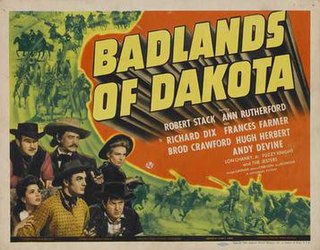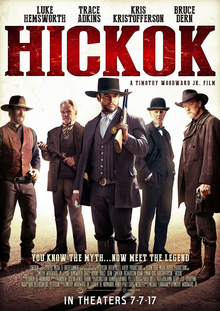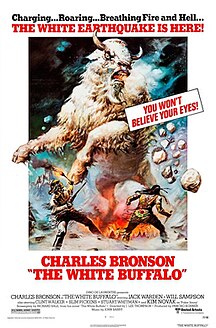 W
WThe Adventures of Wild Bill Hickok is an American Western television series that ran for eight seasons from April 15, 1951, through September 24, 1958. The Screen Gems series began in syndication, but ran on CBS from 1955 through 1958, and, at the same time, on ABC from 1957 through 1958. The Kellogg's cereal company was the show's national sponsor. The series was also exported to Australia during the late 1950s.
 W
WBadlands of Dakota is a 1941 American Western film directed by Alfred E. Green and starring Robert Stack, Ann Rutherford, Richard Dix and Frances Farmer. Its plot follows a sheriff and his girlfriend who cross paths with Wild Bill Hickock and Calamity Jane.
 W
WBuffalo Girls is a 1990 novel written by American author Larry McMurtry about Calamity Jane. It is written in the novel prose style mixed with a series of letters from Calamity Jane to her daughter. In her letters, Calamity describes herself as being a drunken hellraiser but never an outlaw. Her letters also describe her larger-than-life cohorts.
 W
WBuffalo Girls is a 1995 American television miniseries adapted from the 1990 novel of the same name by Larry McMurtry. Directed by Rod Hardy, the miniseries starred Anjelica Huston and Melanie Griffith, with Gabriel Byrne and Peter Coyote. It was nominated for two Golden Globe and several Emmy awards, and won one for sound mixing. This miniseries was first aired on the CBS network over two consecutive nights during the spring of 1995.
 W
WCalamity Jane is a 1953 American Technicolor western musical film loosely based on the life of Wild West heroine Calamity Jane, and explores an alleged romance between Calamity Jane and Wild Bill Hickok in the American Old West. The film starred Doris Day as the title character and Howard Keel as Hickok. It was devised by Warner Bros. in response to the success of Annie Get Your Gun. It was nominated for Scoring of a Musical Picture and Best Sound, Recording. The songs and screenplay form the basis of a stage musical of the same name that has had a number of productions.
 W
WCuster's Last Stand is a 1936 American film serial based on the historical Custer's Last Stand at the Little Bighorn River. It was directed by Elmer Clifton, and starred Rex Lease, William Farnum and Jack Mulhall. It was produced by the Poverty Row studio Stage & Screen Productions, which went bust shortly afterwards as a victim of the Great Depression. This serial stars many famous and popular B-Western actors as well as silent serial star Helen Gibson playing Calamity Jane, Frank McGlynn Jr. as General Custer, and Allen Greer as Wild Bill Hickock.
 W
WDallas is a 1950 American Western Technicolor film directed by Stuart Heisler, and starring Gary Cooper, Ruth Roman, Barbara Payton, and Raymond Massey. The film is set in the title city during the Reconstruction Era of the United States.
 W
WDeadwood is an American Western television series that aired on the premium cable network HBO from March 21, 2004, to August 27, 2006, spanning three seasons and 36 episodes. The series is set in the 1870s in Deadwood, South Dakota, before and after the area's annexation by the Dakota Territory, and charts Deadwood's growth from camp to town. The show was created, produced, and largely written by David Milch. Deadwood features a large ensemble cast headed by Timothy Olyphant and Ian McShane, playing the real-life Deadwood residents Seth Bullock and Al Swearengen, respectively. Many other historical figures appear as characters, including George Crook, Wyatt Earp, E. B. Farnum, George Hearst, Wild Bill Hickok, Calamity Jane, Sol Star, Jack McCall, and Charlie Utter. The plot lines involving these characters include historical truths as well as substantial fictional elements. Milch used actual diaries and newspapers from 1870s Deadwood residents as reference points for characters, events, and the look and feel of the show.
 W
WDeadwood Dick is a 1940 American Western Serial film directed by James W. Horne and starring Don Douglas and Lorna Gray.
 W
WFlashman and the Redskins is a 1982 novel by George MacDonald Fraser. It is the seventh of the Flashman novels.
 W
WHickok is a 2017 American Western film starring Luke Hemsworth as Wild Bill Hickok with Trace Adkins, Kris Kristofferson and Bruce Dern.
 W
WThe Legend of Calamity Jane is a 1997–1998 American/French animated television series. The series followed the adventures of Calamity Jane in Deadwood, South Dakota. The episode "I'd Rather Be in Philadelphia" takes place during the opening of the Centennial Exposition, establishing the shows as being set in 1876. The series had "fuller and richer animation than was customary on Saturday-morning TV."
 W
WThe Legend of the Lone Ranger is a 1981 American Western film that was directed by William A. Fraker and stars Klinton Spilsbury, Michael Horse and Christopher Lloyd.
 W
WLittle Big Man is a 1970 American Western film directed by Arthur Penn and based on the 1964 novel Little Big Man by Thomas Berger. While broadly categorized as a western, or an epic, the film encompasses several literary/film genres, including comedy, drama and adventure. It is about a white male child raised by the Cheyenne nation during the 19th century. The film is largely concerned with contrasting the lives of American pioneers and Native Americans throughout the progression of the boy's life. It stars Dustin Hoffman, Chief Dan George, Faye Dunaway, Martin Balsam, Jeff Corey and Richard Mulligan.
 W
WLittle Big Man is a 1964 novel by American author Thomas Berger. Often described as a satire or parody of the western genre, the book is a modern example of picaresque fiction. Berger made use of a large volume of overlooked first-person primary materials, such as diaries, letters, and memoirs, to fashion a wide-ranging and entertaining tale that comments on alienation, identity, and perceptions of reality. Easily Berger's best known work, Little Big Man was made into a popular 1970 film by Arthur Penn. It has been called "Berger's response to the great American myth of the frontier, representing as it does most of the central traditions of American literature."
 W
WThe Outlaws Is Coming is the sixth and final theatrical comedy western film starring The Three Stooges after their 1959 resurgence in popularity. By this time, the trio consisted of Moe Howard, Larry Fine, and Joe DeRita. Like its predecessor, The Three Stooges Go Around the World in a Daze, the film was co-written, produced and directed by Moe's son-in-law, Norman Maurer. The supporting cast features Adam West, Nancy Kovack, and Emil Sitka, the latter in three roles.
 W
WThe Plainsman is a 1936 American Western film directed by Cecil B. DeMille and starring Gary Cooper and Jean Arthur. The film presents a highly fictionalized account of the adventures and relationships between Wild Bill Hickok, Calamity Jane, Buffalo Bill Cody, and General George Custer, with a gun-runner named Lattimer as the main villain. The film is notorious for mixing timelines and even has an opening scene with Abraham Lincoln setting the stage for Hickok's adventures. Anthony Quinn has an early acting role as an Indian. A remake using the same title was released in 1966.
 W
WThe Plainsman is a 1966 Technicolor remake of the 1936 Cecil B. DeMille western film of the same name. It stars Don Murray as Wild Bill Hickok, Guy Stockwell as Buffalo Bill Cody and Abby Dalton as Calamity Jane.
 W
WPony Express is a 1953 American western film directed by Jerry Hopper and starring Charlton Heston as Buffalo Bill, Forrest Tucker as Wild Bill Hickok, Jan Sterling as a Calamity Jane-type character, and Rhonda Fleming that was filmed in Kanab, Utah. The story is largely based on the 1925 silent film The Pony Express with the threat of a Californian secession from Frontier Pony Express (1939). The film tells a completely imaginary account of the formation of the Pony Express rapid transcontinental mail delivery in the United States in 1860–1861. The picture gives no credit to the real founders of the Pony Express. Buffalo Bill Cody did ride for them —he signed up when he was 15 years old.
 W
WPrairie Schooners is a 1940 American western film directed by Sam Nelson, which stars Wild Bill Elliott, Evelyn Young, and Dub Taylor.
 W
WPurgatory, also known as Purgatory West of the Pecos, is a 1999 American Western fantasy television film directed by Uli Edel. The film premiered on TNT on January 10, 1999. It focuses on a gang of outlaws who find their way to a hidden valley and a peaceful town where residents shun swearing, alcohol, guns and any kind of violence but resemble dead Western heroes. The outcome is marked by its exploration of the interface between legend-making and humanitarian values.
 W
WThe Raiders is a 1963 American Western film directed by Herschel Daugherty and written by Gene L. Coon. The film stars Brian Keith, Robert Culp, Judi Meredith, Jim McMullan, Alfred Ryder and Simon Oakland. The film was released in December 1963, by Universal Pictures.
 W
WThe White Buffalo is a 1977 western film directed by J. Lee Thompson and starring Charles Bronson, Kim Novak, Jack Warden, Slim Pickens and Will Sampson.
 W
WWild Bill is a 1995 Western film about the last days of legendary lawman Wild Bill Hickok. It stars Jeff Bridges, Ellen Barkin, John Hurt and Diane Lane. The film was distributed by United Artists. It was written and directed by Walter Hill, with writing credits also going to Pete Dexter, author of the book Deadwood, and Thomas Babe, author of the play Fathers and Sons. The film has been described as a "psychedelic Western".
 W
WWild Bill Hickok is a 1923 American silent Western film directed by Clifford Smith and starring William S. Hart, Ethel Grey Terry, Kathleen O'Connor, James Farley, Jack Gardner, Carl Gerard, and William Dyer. It was written by William S. Hart and J.G. Hawks. The film was released on November 18, 1923, by Paramount Pictures. It was the first film to depict Wyatt Earp, although in a very brief role, and the only film made before he died in 1929 that included his character, until Law and Order was released in 1932.
 W
WYoung Bill Hickok is a 1940 American Western film directed by Joseph Kane and starring Roy Rogers.